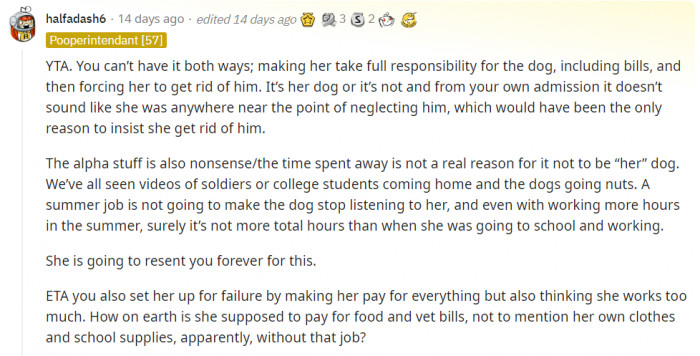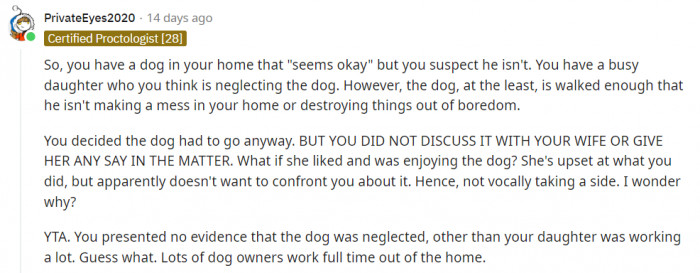Reddit Users Rip Into Father Who Made His Daughter Get Rid Of Her Dog
Parenting is one of the hardest things people go through, and you're often forced to make difficult choices regarding your kids and their well-being. Every parent wants their child to grow up and become a great adult, but that's very hard, especially since you want to keep your kids happy.
It's important to keep your kids happy throughout their childhood, but you have to understand that you can't cater to all of their demands, and you'll get tons of those. At some point in their childhood, most kids will express their wish to have a pet, whether it's a cat, dog, or hamster.
Owning a pet should be considered a lifetime commitment. If you're ready to adopt a furry friend, then you have to be prepared to provide a loving home forever. This isn't what this father had in mind when he let his 16-year-old daughter adopt a dog.
This father decided to post his story on Reddit to see if people would agree with his decision after his daughter stopped talking to him. The story is a bit of a wild ride, and after reading it, the comments we read from other Redditors didn't come as a surprise.
The story begins when the daughter bought a dog under the condition that she would take care of all its needs and pay for everything the dog required. All of these responsibilities were placed on a 16-year-old girl who was going to school and working every day.
Everything was alright until the daughter started working more hours each week, which left her with less time to devote to her furry pal. That doesn't sound that scary to us, but the father saw it as a huge issue, and after arguing about it for a long time, the daughter had to find a new owner for the dog.
Scroll down to read all the details of the story and see what other Redditors had to say about this father.
It all sounds wonderful; the daughter took the dog on walks all the time and even potty-trained it, but the father didn't think this was enough.

The father felt like the daughter wouldn't have been his alpha if she were to move away and take the dog with her.

The OP provided a couple of edits to further explain the situation.

Navigating Family Dynamics and Pet Ownership
Conflicts over pet ownership within families often reflect deeper dynamics related to control, responsibility, and emotional attachment.
Dr. Fiona Hart, a family psychologist, explains that pets often symbolize love and companionship, making decisions about them deeply personal.
Understanding these emotional ties is essential for navigating disagreements about pet ownership.
The Impact of Parental Decisions on Children
Parental decisions, particularly those involving pets, can have profound effects on children’s emotional development. Research from Duke University highlights that children often form attachments to their pets, which can serve as important sources of comfort and companionship. When parents make unilateral decisions to remove pets from the home, it can lead to feelings of abandonment and distress in children.
Understanding the emotional stakes involved in these decisions is crucial for fostering healthy family dynamics. Parents should consider the emotional repercussions of their choices, especially when it comes to beloved family pets.
The people of Reddit didn't hesitate to rip into the father, condemning his actions.

People were especially triggered to hear how much the daughter had to work.

A dog is forever, so you have to make sure you can afford it.

Research shows that family conflicts regarding pets can lead to significant emotional distress for all parties involved.
According to studies published in the Journal of Family Psychology, disagreements over pets often exacerbate existing tensions within the family, leading to increased stress and resentment.
Recognizing the emotional significance of pets can help families approach conflicts with more empathy and understanding.
Moreover, the way a child processes the loss of a pet can reflect broader themes of attachment and loss. According to studies published in the Journal of Child Psychology and Psychiatry, children often experience grief in unique ways, and losing a pet can serve as an early introduction to the concept of loss. Parents can support their children through this process by facilitating open discussions about feelings and providing reassurance during times of change.
Encouraging children to express their emotions can aid in their emotional development and resilience.
Most people thought that his actions were an overreaction.

The father argues that he is trying to teach his daughter how to be a responsible adult.

Let's not forget that the wife apparently had no say in this.

The Role of Communication in Resolving Conflicts
Effective communication is key in resolving conflicts about pet ownership, as it allows family members to express their feelings and concerns.
Dr. Laura Simmons, a communication expert, emphasizes that using 'I' statements can facilitate more productive conversations, reducing defensiveness.
This approach encourages a collaborative problem-solving mindset that can lead to mutually beneficial outcomes.
The Role of Communication in Family Dynamics
Effective communication within families is essential for navigating challenging situations, such as the decision to remove a pet. According to family therapy research, open dialogue can help all family members express their feelings and arrive at a consensus that respects everyone’s emotional needs. When parents involve children in discussions about family decisions, it fosters a sense of agency and belonging.
Moreover, involving children in the decision-making process can help them learn about responsibility and the consequences of choices, further enhancing their emotional intelligence.
The daughter won't forget about this for a long time, if ever.

This is one of the rare occasions where we see Redditors just rip into the OP, and we understand why. Parenting is far from easy, and these are the sort of decisions you have to make from time to time.
How do you feel about the father's actions? Do you think it's justified?
To support children during transitions involving pets, parents can implement strategies that prioritize emotional well-being. For instance, creating rituals around saying goodbye or finding ways to memorialize the pet can facilitate closure for children. Research in grief psychology emphasizes the importance of rituals in helping individuals process loss and find meaning in their experiences.
By acknowledging the emotional significance of pets, parents can help their children navigate these transitions more smoothly.
Fostering Empathy Through Pet Ownership
Ultimately, pet ownership can be an excellent opportunity for children to develop empathy and responsibility. Research from the University of Minnesota indicates that children who care for pets often exhibit higher levels of empathy and social awareness. The experience of nurturing a pet can teach valuable lessons about compassion and the importance of caring for others.
By fostering a supportive environment that encourages empathy, parents can help children process their emotions and develop strong interpersonal skills.
Psychological Analysis
This situation highlights the critical role of parental involvement in decisions regarding pets. Children often form deep emotional ties to their animals, and removing a pet can create challenges that affect their emotional development. By maintaining open communication and considering children's feelings, parents can help mitigate the negative impacts of such decisions.
Analysis generated by AI
Analysis & Alternative Approaches
In conclusion, parental decisions regarding pets can significantly impact children's emotional health and development. By prioritizing communication and understanding the emotional needs involved, families can navigate these challenges effectively. Supporting children through these transitions can foster resilience and empathy, ultimately enhancing their emotional well-being.
Psychologists argue that acknowledging each person's feelings and perspectives is crucial for conflict resolution.
Research indicates that families who practice active listening and empathy are more likely to resolve conflicts successfully.
Creating a safe space for open dialogue can promote understanding and healing within the family.
Practical Strategies for Resolving Pet-Related Conflicts
To address conflicts regarding pets, families should establish clear communication channels and set aside time for discussions.
Research shows that regular family meetings can help address concerns and foster a collaborative approach to pet ownership.
Encouraging open dialogue can strengthen family bonds and lead to more harmonious resolutions.
Moreover, involving a neutral third party, such as a family therapist, can provide valuable support in navigating complex emotional dynamics.
Therapists can facilitate discussions and help families understand each other's perspectives, leading to more constructive conversations.
This approach can help families find common ground and rebuild trust.
Building a Supportive Family Environment
Creating a supportive family environment is essential for nurturing healthy relationships and addressing conflicts.
Research indicates that families who prioritize emotional well-being tend to have stronger connections and better conflict resolution skills.
By fostering an atmosphere of love and support, families can navigate disagreements with greater ease.
In summary, navigating conflicts over pet ownership requires understanding, communication, and collaboration.
By approaching these conversations with empathy and openness, families can foster healthier relationships and create a harmonious home environment.
Analysis & Alternative Approaches
Understanding the emotional dynamics behind pet ownership conflicts can significantly enhance family relationships.
By prioritizing communication and support, families can navigate disagreements more effectively, leading to stronger bonds and greater harmony.



